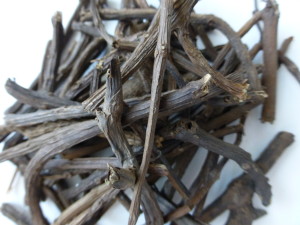Guduchi stem is a shrub that is native to India. Its root, stems, and leaves are used in Ayurvedic medicine.
Contents
Uses
Guduchi stem is used for diabetes, high cholesterol, allergic rhinitis (hay fever), upset stomach, gout, lymphoma and other cancers, rheumatoid arthritis (RA), hepatitis, peptic ulcer disease (PUD), fever, gonorrhea, syphilis, and to boost the immune system.
Benefits
- All parts of guduchi plant are used for various medicinal purposes.
- The plant oil is effective in reducing pain and edema and in gout and skin diseases.
- The herb accords longevity, enhances memory, improves health, and bestows youth, betters complexion, voice, energy and luster of the skin.
- It is helpful in treating digestive ailments such as hyperacidity, colitis, worm infestations, loss of appetite, abdominal pain, excessive thirst, and vomiting and even liver disorders like hepatitis.
- Fresh juice of guduchi, when mixed with rock candy, speeds up the recovery in hepatitis patients.
- It helps in remedying ailments like raktapitta, anemia, cardiac debility, diabetes, sexual debility and splenic disorders.
- The starch of the plant serves as a household remedy for chronic fever, relieves burning sensation and increases energy and appetite.
- The decoction of guduchi, mixed with nimba and vasa, eases the itching and oozing.
- It benefits general weakness, dyspepsia, impotency, dysentery, secondary syphilis, tuberculosis, jaundice, constipation, leprosy, general debility, cutaneous rashes and condylomata.
- Guduchi helps in getting rid of renal caliculi and reduces blood urea level.
- The decoction of guduchi and sunthi is a good combination for treating gout and rheumatic disorders.
- Guduchi juice, when taken with cow’s milk or lodhra, is effective in combating leucorrhea.
- The juice is mixed with cumin seeds and consumed to reduce the burning sensation caused due to pitta.
- The root of guduchi is a strong emetic and used for bowel obstruction.
Caution
Guduchi stem seems to be safe when used short-term. The safety of long-term use, more than 8 weeks, is not known.
Special Precautions & Warnings:
Pregnancy and breast-feeding: Not enough is known about the use of Guduchi stem during pregnancy and breast-feeding. Stay on the safe side and avoid use.
Diabetes: Guduchi stem might lower blood sugar levels. Use it cautiously if you have diabetes, and monitor your blood sugar levels. The doses of your diabetes medications might need to be adjusted.
“Autoimmune diseases” such as multiple sclerosis (MS), lupus (systemic lupus erythematosus, SLE), rheumatoid arthritis (RA), or other conditions: Guduchi stem might cause the immune system to become more active, and this could increase the symptoms of autoimmune diseases. If you have one of these conditions, it’s best to avoid using Tinospora cordifolia.
Surgery: Guduchi stem might affect blood sugar levels, so there is a concern that it might interfere with blood sugar control during and after surgery. Stop taking Tinospora cordifolia at least 2 weeks before a scheduled surgery.
Interactions
- Medications for diabetes (Antidiabetes drugs) interacts with Guduchi stem
Tinospora cordifolia might decrease blood sugar. Diabetes medications are also used to lower blood sugar. Taking Tinospora cordifolia along with diabetes medications might cause your blood sugar to go too low. Monitor your blood sugar closely. The dose of your diabetes medication might need to be changed.Some medications used for diabetes include glimepiride (Amaryl), glyburide (DiaBeta, Glynase PresTab, Micronase), insulin, pioglitazone (Actos), rosiglitazone (Avandia), chlorpropamide (Diabinese), glipizide (Glucotrol), tolbutamide (Orinase), and others.
- Medications that decrease the immune system (Immunosuppressants) interacts with Guduchi stem
Tinospora cordifolia might increase the immune system. Taking it along with some medications that decrease the immune system might decrease the effectiveness of these medications.Some medications that decrease the immune system include azathioprine (Imuran), basiliximab (Simulect), cyclosporine (Neoral, Sandimmune), daclizumab (Zenapax), muromonab-CD3 (OKT3, Orthoclone OKT3), mycophenolate (CellCept), tacrolimus (FK506, Prograf), sirolimus (Rapamune), prednisone (Deltasone, Orasone), corticosteroids (glucocorticoids), and others.
Other names
Ambervel, Amrita, Gilo, Giloe, Giloya, Glunchanb, Guduchi, Gulvel, Gurcha, Heart-Leaved Moonseed, Heavenly Elixir, Indian Tinospora, Jetwatika, Moonseed, T. Cordifolia, TC, TCRE, TCRET, Tinospora, Tinospora Indien, TinosporiaCordifolia, Tinosporia Cordifolus
Reference
ILoveIndia.com, http://www.iloveindia.com/indian-herbs/tinospora-cordifolia.html

